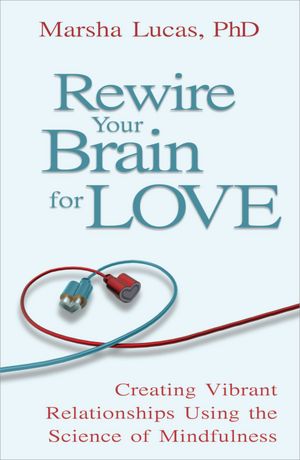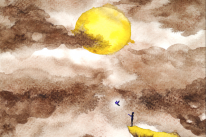
Update: The winners for this giveaway have already been chosen. Subscribe to Tiny Buddha for free daily or weekly emails and to learn about future giveaways!
The winners:
An old friend once told me that women frequently say all the men they’ve dated have been jerks; and men frequently say all the women they’ve dated have been crazy.
You could chalk this up to gender differences, men being from Mars, women being from Venus and all that. But maybe there’s more to it. Maybe it’s actually our biology that influences how we act and interact—and why we often repeat unhealthy patterns with our romantic partners.
In her book, Rewire Your Brain for Love: Creating Vibrant Relationships Using the Science of Mindfulness, Marsha Lucas explains how our inner workings can sabotage our relationships, and how we can change that through meditation.
According to Rick Hanson, PhD, reading Rewire Your Brain for Love is “like having a best friend who is both savvy about the brain and a world-class therapist.”
I haven’t yet finished this book; I’m publishing this interview today because this is the official launch date. Based on what I’ve read so far, I can say with absolute certainty this is the most fascinating, helpful relationship book I have ever read.
Both educational and insightful, Rewire Your Brain for Love explains why we struggle in matters of the heart, and exactly what we need to do for healthier, happier relationships.
The Giveaway:
To enter to win 1 of 2 free copies of Rewire Your Brain for Love:
1. Leave a comment below.
2. Tweet: RT @tinybuddha Book Giveaway and Interview: Rewire Your Brain for Love http://bit.ly/yCvNBJ
If you don’t have a Twitter account, you can still enter by completing the first step. You can enter until midnight PST on Sunday February 5th.
The Interview:
1. What inspired you to write this book?
The inspiration came from seeing the changes in my psychotherapy patients when mindfulness practice was added to the mix. It was sometimes a challenge to get past the resistance some people had to meditation—my psychotherapy office is just a half-dozen blocks from the White House, so I see a lot of people who are very intellectually-driven, “show me the evidence” folks with no room for any “woo” stuff.
It was a whole lot easier when we talked about the neurological bases of relationships, the peer-reviewed research coming out of neuroscience labs at universities they respected, and about this simple, well-documented practice that they could use to create actual changes in the brain—and that those changes support healthier, more successful relationships. Approaching it this way made it a much more empowering choice for them.
Writing the book came out of my wish to share this with more than just the people I could see in my psychotherapy office. On the micro level, I want more people to have the healing experience that healthy relationships offer. At the macro level, my wish is to be a part of helping create a world that’s driven more by empathy than by fear.
2. Why do we need to rewire our brains for love?
Unfortunately, lots of us didn’t have an optimal experience of healthy, attuned attachment in that early, critical time when our “relationship brains” develop (mostly before age 2).
By the way, it’s not necessarily about really bad experiences—it can be subtle, passed along by well-meaning parents who may not have had that optimal experience themselves.
And because of the way our brains develop, those very early experiences aren’t readily accessible through memory or insight, so it’s difficult to get any traction just by trying to think or “will” our way through.
If you can change that wiring, though—and mindfulness practice seems to help a great deal with that—then you can have a brain with better neural pathways that creates and supports better relationships.
3. Your book focuses on making improvements in our relationships with other people. Can we also rewire our brains for greater self-love?
Absolutely! I’d go farther to say that improving your relationship within yourself is the first step to being able to have better connections with others. I think of the practice of mindfulness as a way of cultivating more loving, compassionate relationships with everyone, and that includes you.
4. Is traditional meditation necessary to rewire our brains for love, or are other mindfulness practices equally effective?
The mindfulness practices that I’ve used to the best effect in my work (and that are in my book) are from the insight-meditation tradition. That approach has (in my view) the most compelling neuroscience research to date supporting the types of changes that I talk about and see in my work.
Other forms of contemplative practice are also being studied. They all definitely have benefits—and I’m very interested in seeing more about their benefits to the brain.
5. Can you talk a little about the seven “high-voltage” benefits of practicing mindfulness?
The “high-voltage” relationships benefits get me really excited, so much so that they form the framework of my book.
First thing to know: there are essential characteristics seen in people who had healthy, attuned childhood relationships—characteristics that bode incredibly well for their ability to have healthy relationships as adults.
Now, add to that: Those same characteristics are seen in people who practice mindfulness.
Then, to top it all off: the latest scientific research has increasingly been showing that these characteristics are associated with areas of the brain that change as a result of mindfulness practice.
I’ve found that the most helpful way to think about these characteristics is to group them into a list of seven acquirable skills. (Yep: acquirable.)
- Better management of your body’s reactions
- Improved regulation of fear
- Greater emotional resilience
- Increased response flexibility
- Improved insight (self-knowing)
- Deeper and clearer empathy and attunement—within yourself and with others
- Perspective shift from “me” to “we”
Daniel Siegel, MD, a Harvard-trained psychiatrist and an expert on childhood attachment was the person who first made me aware of the connection between these documented and compelling characteristics of well-being, seen in people who grew up with healthy, attuned attachments, and the brain structures and pathways shown to change with mindfulness practice.
I’ve been seeing the results confirmed through my psychology practice, in myself, and in the lives of my friends and colleagues. Very, very cool.
6. I know a lot of people who stay in unhealthy relationships, constantly looking for ways to “fix” them. How can one recognize when the problem is faulty wiring and when it’s best to walk away?
My first response is to share an anecdote from a friend of mine, Gay Hendricks, who’s also a psychologist: A middle-aged man came to his first therapy session, and talked about how lousy women were—he presented a long list of women in his life who’d just used him. Close to the end of the session he leaned in and quietly said, “But y’know… I’m beginning to wonder if it might have something to do with me.”
We all have our relationship wiring issues—our own styles of attachment that developed early on. In part, mindfulness practice helps you increase your capacity to look at your relationship patterns with honesty and self-compassion (not excuses or blame). That’s necessary whether you’re going to stay in the relationship or end it. Otherwise, you end up staging the same play with the same script over and over again, whether it’s with the same actors or new ones.
7. In Chapter 8, you explore empathy and how you misunderstood it when you were younger. I saw myself in your words, as I had the same experience! Can you tell us a little about what empathy is and what it isn’t—and why it’s important to our relationships to understand the difference?
Healthy, balanced empathy is a tough one for a lot of people, especially those whose role in life leans heavily toward helping others. It’s easy to get lost in the feelings and needs of the other person, and end up not holding on to any empathy for yourself—and that often leads to feelings of burnout, resentment, depression, all kinds of un-fun stuff.
My take on empathy is heavily influenced by the way that Frans de Waal, PhD talks about it—he’s a world-renowned primatologist and director of the Yerkes Living Links Center at Emory University, and he looks at empathy as an evolutionary advancement. As you go “up” in evolutionary terms, there are increasingly developed levels of empathic abilities, starting with the kind of “emotional contagion” that you might see in a herd of zebras, on up to through being able to take someone else’s perspective (though as Frans points out, psychopaths are good at this, too).
Where many of us get off track is taking it to the next level, empathic perspective taking—what is s/he feeling and why might that be? And what am I feeling in response, and why might that be? If you lose sight of either one, you’re more likely to react out of old, unhealthy relationships habits—what can be called “autopilot.”
Empathy’s not just about insight, and not just about feeling—it’s about an integration of those, happening in the space between you and your partner. Or, between you and more people in your community, however large that community may be—we’re all in this together, after all.
Choosing to cultivate more empathy doesn’t mean losing your own integrity or point of view—it just means that you’re no longer governed by lower-order, fear-based reactivity. Now that’s empowering!
Learn more about Rewire Your Brain for Love on Amazon.
FTC Disclosure: I receive complimentary books for reviews and interviews on tinybuddha.com, but I am not compensated for writing or obligated to write anything specific. I am an Amazon affiliate, meaning I earn a percentage of all books purchased through the links I provide on this site.
About Lori Deschene
Lori Deschene is the founder of Tiny Buddha. She started the site after struggling with depression, bulimia, c-PTSD, and toxic shame so she could recycle her former pain into something useful and inspire others to do the same. You can find her books, including Tiny Buddha’s Gratitude Journal and Tiny Buddha’s Worry Journal, here and learn more about her eCourse, Recreate Your Life Story, if you’re ready to transform your life and become the person you want to be.
- Web |
- More Posts













 Though I run this site, it is not mine. It's ours. It's not about me. It's about us. Your stories and your wisdom are just as meaningful as mine.
Though I run this site, it is not mine. It's ours. It's not about me. It's about us. Your stories and your wisdom are just as meaningful as mine.
I’m still trying to rewire my brain for love because I was hurt really bad but I’m learning ti get over it and get back to life. P.S. Lori, I did retweet! =)
It looks like it would be an interesting read…
I don’t have twitter but sounds like an interesting read! I’m in.
Love is all we need. <3 I don't have twitter.
Sounds like a great book!
I would love to win this:)
Would love to win this!
I’ve recently been tryIng and reading about ways of improving my relationships, becoming more self-confident, and being better at “going with the flow.” Sounds like this book just might combine all of these aspects in a very interesting way. I’m intrigued!
interested!!!!
Wow, what a great interview! Very meaty and fascinating. Sounds like a book I’d be interested in reading. Thank you for this unique and informative introduction into a new take on relationship-building.
I love learning about the wonderful ability of the brain to adapt and re-wire itself. I would adore a copy of this to read!
This does sound like a really interesting way to bring about positive changes. In some areas of my life I have been able to achieve the changes I want, but other areas seem so stubbornly resistant. Very interested!
I’ve been following Dr. Marsha for awhile now and I look forward to reading this book. I love the meeting of science and ‘woo’ that comes out in her ideas.
sounds like a very interesting and useful book!
I wonder how I can convince my scientist husband to read this with me!
Would love to read this!
I wonder if I can convince my ultra religious mother to read this with me.
I would love to read a copy of the book
This book sounds excellent. I would love to read it in this point of my life, recently in the dating game again! Ahhh!
This sounds interesting 🙂
I would love to win this book. It seems like it would be very interesting, insightful and helpful!
sounds like a good thing ,I’ll admit it, I have some habits that always end up hurting me when it comes to relationships
I would love to win this book! Not only would it benefit me, I would share it with my readers as well! Many blessings!
http://thislittlelark.wordpress.com
http://www.facebook.com/thislittlelark
Sounds like just what I need to read right now… funny how the things you need get put right in your path
Finishing up Mindfulness in Plain English. Would love to start in on this next!
Boy do I need this book! I agree that meditation helps. There are so many times in my relationships I get upset and want to say something I know I shouldn’t say. If I just call down and remember to breath and really truly think before I speak, I usually decide against voicing what I was thinking, and this usually turns out for the better!!!
Love,
Sarah
I could definitely use some guidance from a book like this in light of recent events. Unfortunately I don’t have a twitter. But maybe I’ll get lucky and win a copy of this book!
This book sounds fabulous, and just what I need right now.
Epiphany # 1026 It Takes hard work not just Luck.
I have been on a personal mission to repair and undo all of the bad that had become the norm….. I think this book would do wonders for me. <3
I’m always up for some brain rewiring 😀
As a 40 something single mom who has pretty much stopped hoping and believing that there is a great love out there for me, I really want to win this! Even if I don’t, still planning to buy it!
I am a 40 something single mom as well. I am soo hopeful that there is a great love our there for me! Don’t lose hope!!!
This book sounds like it could offer some advice I need!
Really looking forward to reading this. Just quit the dating site I was on as it wasn’t a positive force in my life and like the idea of focusing on the changes I can make to become more open to love.
looks to be very interesting and helpful thanks for a chance to win. also tweeted. twitter name wld4scrpn
I could definately use the book, I am 6 months post-divorce and Tiny Buddah has become a daily inspiration for me!
Sounds like a wonderful read for me. As a young widow, I definitely think I need to rewire my brain for love. I love your blog, it always is applicable! Thanks for your courage to share.
Sounds like a solid path of making needed changes in ones life!
Curious topic! Would like to read this literature on love since I find it a difficult one to conquer. Are there others by this author?
I really need this book, i need all the help i can get!
I would love to read this book! Married to a great man and have two young daughters. Learning to be more mindful would help my relationship with all three of them.
I never win anything so I’m hoping that I win!
Sounds great! Would love to read this!
Would love a ‘Re-wire’ 😉 Things can only get better!!!
I too could definitely use a copy of this book! It would be perfect timing 🙂
If I can’t win it…..where and when can I but it??? Can’t wait!
I love all the inspirational material on this site and would love to read your book!
The focus of mindfulness and love gets my attention every time. Presents as an enlightening read. Winning something is always a wonderful gift, but I’m definitely adding this to my “to read” list ( thanks to the TinyBuddha blog, I’ve got an ever-growing list!)
love’n’light
Patty
I could use a little re-wiring myself.
I think everyone could use this book! 🙂
“Healthy, balanced empathy is a tough one for a lot of people”
Ohhh yes… I always seem to go too far one way or the other!